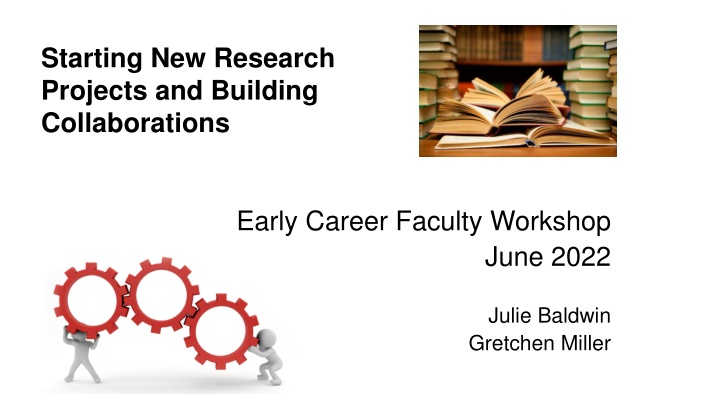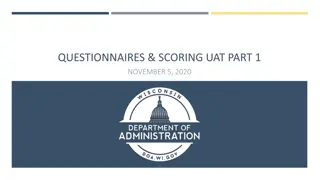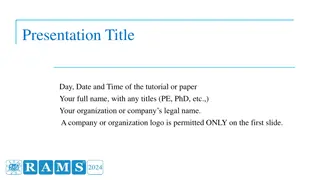
Building New Research Directions for Early Career Faculty
"Explore strategies and considerations for embarking on new research projects as an early career faculty member. Learn how to develop innovative research directions, leverage local resources, and diversify your projects for success in academia. Join the workshop with experts Julie Baldwin and Gretchen Miller to kickstart your journey towards becoming a recognized expert in your field."
Download Presentation

Please find below an Image/Link to download the presentation.
The content on the website is provided AS IS for your information and personal use only. It may not be sold, licensed, or shared on other websites without obtaining consent from the author. If you encounter any issues during the download, it is possible that the publisher has removed the file from their server.
You are allowed to download the files provided on this website for personal or commercial use, subject to the condition that they are used lawfully. All files are the property of their respective owners.
The content on the website is provided AS IS for your information and personal use only. It may not be sold, licensed, or shared on other websites without obtaining consent from the author.
E N D
Presentation Transcript
Starting New Research Projects and Building Collaborations Early Career Faculty Workshop June 2022 Julie Baldwin Gretchen Miller
New Research Projects You ve finished your PhD and/or post-doc. Now what? It is important for you to become recognized as an expert in some area(s) Continue working along the line of your PhD/post-doctoral research? Start in new directions?
New Research Projects What ideas do you have for new research? #1 In what area(s) would you like to become known as an expert? #2 In what area(s) would like to develop new research?
New Research Projects How do you develop new research directions? Getting started - Address questions you have had in the past - Read papers on topics related to your field - Attend different sessions at conferences Talk to other people - PhD/post-doc advisor - Colleagues in your department and/or the person you replaced - Make new connections
New Research Projects Things to consider when choosing new directions: Make sure topic is of broad interest Build on your strengths and expertise More of the same is not easy to fund Don t aim too big the topic needs to be solvable given your experience/capabilities Find out what is being done already in your field (don t want to do something that is already being done!) Collect preliminary data to demonstrate feasibility
New Research Projects Things to consider when choosing new directions: Take advantage of your local resources How to apply your expertise to the local geology/environment Local industry Two-year, HBCU, or tribal college partners Use existing departmental facilities Capitalize on student interest
New Research Projects Diversify - Try to build your research so you are working on more than one project at a time. Variety is the spice of life! Minimizes delays due to equipment failure or competitive NSF programs Will provide projects for a larger number of students You can be working on writing up one project while starting another Ideally will provide a steady stream of papers
New Research Projects Breakout discussion: Think about your strategies for starting new research projects at your institution and what resources you need to get started. Add these to your written answers to questions #1 and #2. After you complete this, discuss your ideas, strategies and/or challenges for starting new research projects with your table group.
Building Collaborations Advantages of collaborative research The sum is greater than the parts Learn from your collaborators Helps to increase opportunities for funding Fostering a community can lead to future opportunities
Building Collaborations Collaborations close to home Colleagues with complementary interests Senior-level colleagues Colleagues with instrumentation that may be of use to you Colleagues within your university but outside your department Industry partners, Two-year colleges, HBCUs, tribal colleges
Building Collaborations Collaborations farther from home how do you meet people? Professional meetings Try some new, smaller meetings (e.g. Gordon conferences) good investment of start-up Go to smaller functions at big meetings (e.g. Area of interest meetings at AGU) #3 Who might be able to work with you (near or far) in new or ongoing research?
Building Collaborations How do you make yourself known? Convene sessions at professional meetings Invite established scientists to give talks in your session or at your home institution Serve on panels and committees Introduce yourself to people whose work you know Use social networks and media (GeoTwitter, ResearchGate) Share your research, make it accessible #4 List some activities to help make yourself known and diversify your network of collaborators
Starting New Research Projects and Building Collaborations #5 Commit to one thing you will do.
Initiating Collaborations How do you ask? 1) Do your homework. Know what your collaborator does and what they can contribute. 2) Introduce yourself first ideally you have the opportunity to interact with them or meet them in person first 3) Send them an email, Call them on the phone, Talk to them at a conference 4) Sell the science 5) Make the contributions/expectations of each partner clear
Starting New Research Projects and Building Collaborations #6 Pitch






















